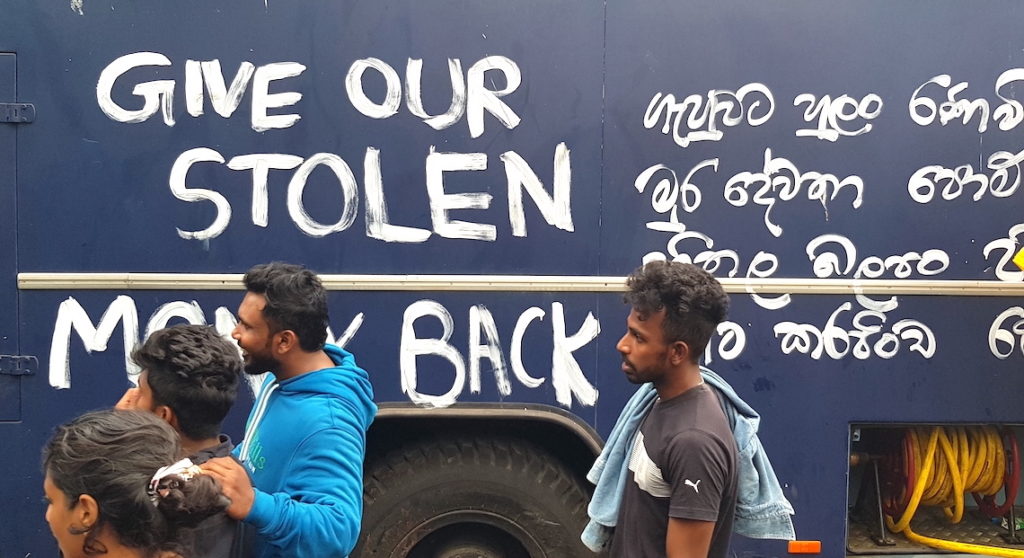What started off as a few localised protests against the lack of basic necessities, skyrocketing prices and corruption erupted into a fully fledged people’s power movement that succeeded in ousting a fearsome, corrupt and incompetent president whose all encompassing powers proved to be of no use in the end.
He and his inner circle demonstrated that they were incapable of governing the country despite all their election promises and pronouncements. Elected on a platform of fear and racism, hoodwinking the voters with vistas of prosperity and splendour propelled the country into economic ruin from which the road back will be stony and treacherous.
The people’s protests were driven mainly by a group of young, committed and creative people determined to carve out a better future for themselves by demanding accountability, honesty and transparency from their elected leaders. In the short space of three months, they were able to get the resignation of the cabinet, the prime minister and eventually achieve their main goal of getting rid of President Gotabaya Rajapaksa. So what happens now?
Poet, screen writer and film director Nayomi Apsara has been in the forefront of the aragalaya and answers questions from Groundviews about the way forward and what remains to be achieved.
How did you become involved in the aragalaya and Gotagogama?
My involvement in the argalaya happened on the cultural front of the movement. A few of us thought that art could be used as a tool to get people to think about the current situation in the country and about why we are doing an aragalaya, and also to find ways of accessing to the many kinds of people we began to meet at the aragalaya. With these intentions and hopes we brought in the art factor to the people’s struggle at Gotagogama and, introducing a new cultural dimension through a cinema, a few filmmakers including myself initiated the Teargas Cinema theatre at Gotagogama. We have been successfully running the space and held two seasons of Galle Face Independent Film festival screening internationally recognised movies and documentaries followed by fruitful discussions with the participation of audience from all walks of life, artists and academics. I have been curating the Teargas Cinema with the generous donations from friends, organisations, cinema and art lovers.
Are you happy with what the aragalaya has achieved?
That kind of a question requires me to make a judgment about a complex situation, a situation that is unfolding right now. As such it is not fair by the reasons and history behind this phenomenon for me to make subjective statements on this. I do not suggest that we could be happy or sad about these immediate outcomes. These are progressive movements contributing towards community that will continue to evolve. What we see in these struggles and upheavals is a potential that the general public has, which I am sure our politicians never thought we had. The South, which is portrayed as subservient to nationalist politicians, has shown that it is not the case. The greatest gesture of this struggle is the attack on the idea of privileged politicians with utmost power. For me it is this formula that is at the root of our crisis.
Did you always believe you would succeed or did you sometimes lose hope?
This again is a difficult question. Success cannot be defined beforehand. Success is a process. In a process, the idea of success gets rephrased, reimagined by the process itself. Any artist or any group who has a hardened idea of success would end in creating failure or chaos. Success becomes success after the process or rather with the process. We cannot have a firm idea about the future. People should continue to seek answers and be able to analyse developments. I am a seeker. Successes and outcome orientations are quite materialistic. We cannot decide for or on behalf of evolving communities. That’s the stuff of extremism.
Getting rid of the corrupt regime was the start. What should happen now?
I am not sure we are getting rid of a corrupt regime because the Rajapaksas have gone. We need to understand who made such large scale corruption possible within the state. Who are the enablers of such corruption? Mega politicians like the Rajapaksas always exploited a populist terrain prepared by or reaped the harvest sown by two lines of discourses – the “giving subsidies is social development” discourse and “Sinhala-Buddhist nation is under threat” discourse. We may be rid of the Rajapaksas but the people who enabled them remain in the parliament. For me the aragalaya has only begun. There is a long way to go.
What are the other issues that need to be addressed to have a peaceful and prosperous country?
We have to make this a democratic country, not only in the parliament but in the government institutions as well. We have to work towards policies that prevent politicians from deciding everything. What I hear from my friends working in government institutions is that none of our government institutions are democratic. Acts and ordinances governing our state institutions need to be reworked. When the heads of government institutions are appointed by politicians, they do not listening to what people who have been working in these institutions tell them but they listen to the politician who appointed them. This is true from universities to state banks and state committees. How can you expect Sri Lanka to be a democratic place when the basics of democracy are not inscribed in the documents that govern the state sector? We need to reimagine the state sector. I don’t think that we need university professors to be appointed as secretaries to ministries or some experts as secretaries or heads of government institutions. Let civil servants do civil administration, let professors teach at universities and let experts practice in their respective fields. Make the state sector a space where heads of institutions do not act like feudal lords or colonial era officials.
